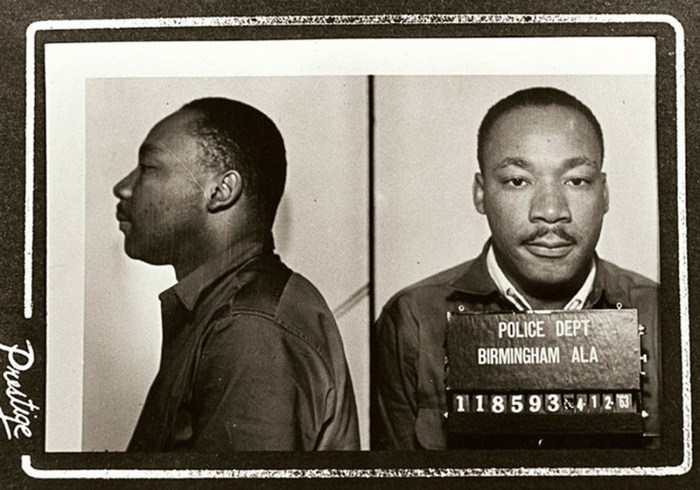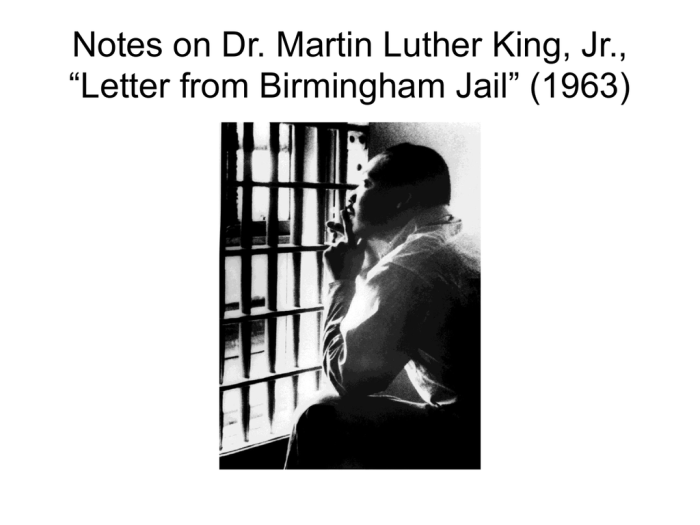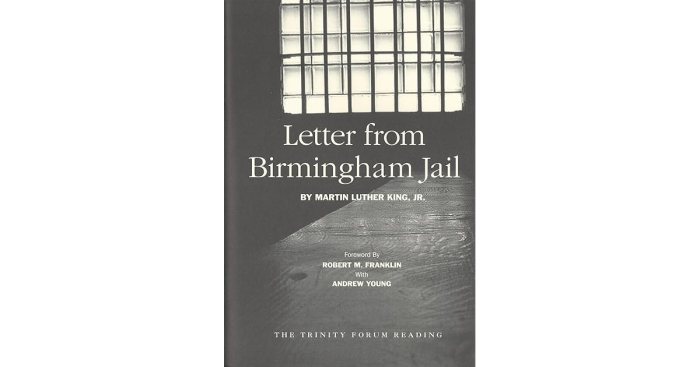Discussion questions letter from birmingham jail – The “Letter from Birmingham Jail” is a powerful and persuasive document written by Dr. Martin Luther King Jr. in 1963 while imprisoned for his role in the Birmingham campaign. This letter eloquently articulates King’s philosophy of nonviolent resistance and his arguments against segregation and racial injustice.
It remains a seminal text in the Civil Rights Movement and a testament to the enduring power of words to inspire and mobilize for social change.
In this discussion, we will delve into the historical context of the letter, analyze King’s rhetorical strategies, examine his key arguments, and explore the impact and legacy of this pivotal document. We will also consider the ways in which King’s ideas continue to resonate with contemporary issues of social justice and inequality.
Historical Context: Discussion Questions Letter From Birmingham Jail

The “Letter from Birmingham Jail” is a seminal work written by Dr. Martin Luther King Jr. in response to a public statement by eight white Alabama clergymen criticizing his nonviolent protests against racial segregation in Birmingham, Alabama. The letter, written in 1963 while King was imprisoned for his participation in the Birmingham campaign, provides a powerful and eloquent defense of nonviolent resistance and a scathing indictment of the city’s segregationist policies.
The Civil Rights Movement in Birmingham, Alabama, was characterized by widespread discrimination and violence against African Americans. In 1963, the city was a hotbed of racial tension, with segregation enforced in all aspects of public life. King and other civil rights leaders organized a nonviolent campaign of protests and boycotts to challenge the city’s segregationist laws and practices.
Rhetorical Strategies
In the “Letter from Birmingham Jail,” King employs a range of rhetorical strategies to persuade his audience and build support for the Civil Rights Movement.
Ethos, Discussion questions letter from birmingham jail
King establishes his credibility and authority by drawing on his own experiences as a civil rights leader and his deep understanding of Christian principles. He also cites historical figures and events to support his arguments.
Pathos
King appeals to the emotions of his audience by describing the injustices and suffering faced by African Americans in Birmingham. He uses vivid language and personal anecdotes to create a sense of urgency and empathy.
Logos
King presents a logical and well-reasoned argument against segregation and racial discrimination. He uses evidence, statistics, and historical examples to support his claims and refute the arguments of his critics.
Rhetorical Devices
King employs a variety of rhetorical devices to enhance the impact of his letter, including:
- Anaphora:The repetition of words or phrases at the beginning of successive sentences or clauses.
- Parallelism:The use of similar grammatical structures to create a sense of balance and rhythm.
- Antithesis:The contrast of opposing ideas or concepts to create emphasis.
- Metaphor:The comparison of two unlike things to create a vivid image or idea.
Key Arguments
King’s main arguments against the Birmingham Police Commissioner and the city’s segregationist policies center around the following points:
- Injustice and Immorality of Segregation:King argues that segregation is unjust and immoral, violating the fundamental principles of equality and human dignity.
- Failure of Moderate Approaches:King contends that moderate approaches to racial reform have failed to achieve meaningful change and that more direct and confrontational tactics are necessary.
- Nonviolence as a Moral Imperative:King emphasizes the importance of nonviolent resistance as a moral and strategic necessity, arguing that it is the only way to achieve lasting social change.
Nonviolent Resistance

King’s philosophy of nonviolent resistance is central to the “Letter from Birmingham Jail.” He argues that nonviolence is not simply a passive form of protest, but an active and courageous stance that seeks to transform both the oppressor and the oppressed.
King believed that nonviolence could break the cycle of violence and hatred that plagued race relations in the United States. He saw it as a way to appeal to the conscience of white Americans and to create a more just and equitable society.
Social Injustice and Inequality

In the “Letter from Birmingham Jail,” King addresses a wide range of social injustices and inequalities that African Americans faced in Birmingham and across the United States.
- Racial Segregation:King condemns the segregation of public spaces, schools, and housing, arguing that it creates a system of apartheid that denies African Americans basic human rights.
- Economic Inequality:King highlights the economic disparities between white and black Americans, pointing to the lack of job opportunities, low wages, and poor housing conditions faced by African Americans.
- Police Brutality:King speaks out against the excessive use of force by police officers against African Americans, arguing that it is a form of state-sanctioned violence.
Impact and Legacy

The “Letter from Birmingham Jail” had a profound impact on the Civil Rights Movement. It helped to galvanize support for nonviolent resistance and raise awareness of the injustices faced by African Americans.
The letter’s legacy continues to resonate today, as it remains a powerful reminder of the importance of fighting for social justice and equality.
FAQ Corner
What is the main argument of King’s “Letter from Birmingham Jail”?
King’s main argument is that segregation and racial injustice are morally wrong and must be opposed through nonviolent resistance.
How does King use rhetorical devices to persuade his audience?
King uses a variety of rhetorical devices, including ethos, pathos, and logos, to appeal to his audience’s reason, emotions, and sense of morality.
What is the significance of the “Letter from Birmingham Jail” in the Civil Rights Movement?
The letter was a turning point in the Civil Rights Movement, helping to mobilize support for nonviolent resistance and galvanizing the nation to confront racial injustice.